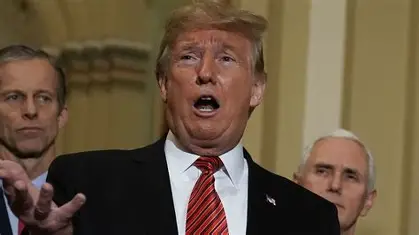By Innovation Times Political Editorial Board
October 14, 2025 | Washington, D.C.
President Donald Trump faces an unexpected political challenge not from Democrats, but from within the broader conservative movement itself. Robert F. Kennedy Jr., once dismissed as a fringe figure, has emerged as a serious disruptor whose populist campaign is dividing Republican voters and threatening to upend the president’s legislative and electoral agenda ahead of the 2026 midterm elections.
Kennedy’s message of political independence, medical freedom, and institutional accountability has struck a chord with voters disillusioned by partisan gridlock. His growing influence among conservatives, libertarians, and independents has raised alarms inside the White House and among Republican strategists who fear his movement could peel away enough support to weaken the president’s re-election coalition.
“Make no mistake, Kennedy’s challenge isn’t about party loyalty, it’s about ideology and authenticity,” said a senior GOP strategist familiar with the administration’s internal polling. “He’s tapping into the same frustrations that helped Trump win, but he’s repackaging them for voters who feel let down by Washington.”
Within the administration, aides are reportedly working to minimize Kennedy’s impact by reinforcing Trump’s image as a strong wartime leader and a champion of the American working class. The president has publicly dismissed Kennedy’s growing popularity, calling it “a temporary distraction” fueled by media hype.
Yet behind the scenes, party officials are worried. Recent polls suggest that Kennedy’s appeal could shave several points off Republican margins in key battleground states, particularly among younger and independent voters who are drawn to his outsider message. Even a small shift could prove decisive in tightly contested congressional races next year.
Kennedy’s campaign has positioned itself as a movement for political reform rather than a direct attack on Trump. However, his rhetoric about government overreach, pharmaceutical power, and media manipulation has resonated with segments of the conservative base who have grown skeptical of the current administration’s alliances and tactics.
“The president built a movement around fighting the establishment,” noted political analyst Dr. Carla Bennett. “Now, Kennedy is presenting himself as the new anti-establishment voice, and that’s a narrative the White House can’t easily control.”
The Republican National Committee has downplayed the threat, but privately, officials admit that Kennedy’s rise has complicated their midterm strategy. Some Republican lawmakers worry that his presence could depress turnout or split the conservative vote, inadvertently benefiting Democrats in closely divided districts.
Kennedy’s growing visibility also underscores a larger identity crisis within the Republican Party. The GOP has long balanced traditional conservatism with populist nationalism, but Kennedy’s influence is forcing a new debate about what the party stands for in the post-establishment era.
If the president’s team cannot unify the conservative base, analysts warn that the midterms could become a referendum not just on Trump’s leadership, but on the future of American populism itself.



